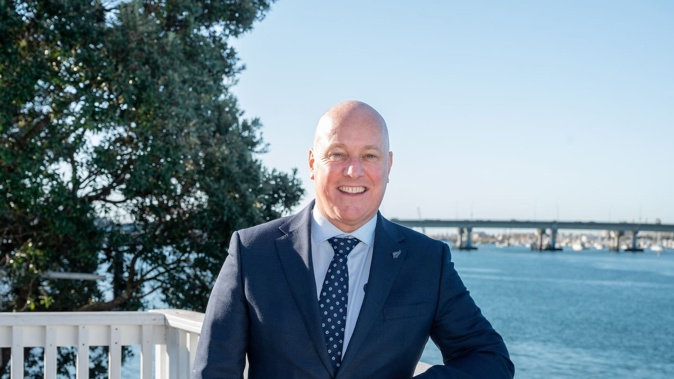
Prime Minister Christopher Luxon has dismissed a Green Party proposal to extend the Auckland–Hamilton passenger rail line to Tauranga, saying his Government is focused on delivering road infrastructure to meet the region’s rapid growth.
“Others can talk about lots of ideas – and that’s lovely – but we’re the party that gets on and gets things built,” Luxon said during a visit to Tauranga on Thursday.
“This region is growing fast, and we need to keep pace and get these done and delivered for people.”
His comments came the same day Green MP and transport spokeswoman Julie Anne Genter launched a petition on The Strand calling for passenger rail to be reinstated to Tauranga.
But Luxon made it clear road investment remains his Government’s top transport priority.
“What we really need to do is kick on and get serious about a high-quality roading infrastructure between Tauranga, Hamilton, and ultimately into Auckland,” he said.
“That golden triangle is critical to New Zealand’s economy.”
Luxon cited the State Highway 29 Ōmanawa Bridge Replacement project as a key development already under way.
“We’re kicking that off before Christmas, which is excellent.”
It was among $6 billion in government-funded infrastructure projects that Luxon, with Economic Growth Minister Nicola Willis and Infrastructure Minister Chris Bishop, recently announced were scheduled to begin in 2025.
He also pointed to the exponential growth in the kiwifruit sector, which he said now generated $4 billion annually – up from $2.8b.
“Eighty per cent of that comes from this region, and it’s moved via our roads. That’s why we’ve got to get our roading infrastructure first and foremost sorted and done.”
Luxon said building strong transport links was the single biggest change that could be made to unlock both economic and social benefits.
Key ongoing regional priorities include the State Highway 29 upgrade through Tauriko West, the Takitimu North Link Stage 1 from Tauranga to Te Puna, and Stage 2 to Ōmokoroa. Luxon has previously described Tauranga’s traffic as a “zoo”, underscoring the need for faster project delivery.
 Prime Minister Christopher Luxon. Photo / Brydie Thompson
Prime Minister Christopher Luxon. Photo / Brydie Thompson
“We’ve got to follow through. It’s about freight, and it’s about people getting home to their families,” he said.
“When we build good roading infrastructure, we boost productivity and get social benefits. We’ve got to focus on getting that roading network really sorted for New Zealand.”
Luxon also addressed the housing shortfall in the region, saying several developments are currently progressing through the government’s fast-track process.
“We’ve got new roads to build that will unlock housing capacity.”
A 2023 capacity assessment warned of a shortfall of about 4000 dwellings in Tauranga by 2030 under high-growth scenarios.
“We’ve got to get the Resource Management Act sorted – there’s no doubt about it,” Luxon said.
“When it takes 19 months to build a three-bedroom house, and building costs are 50% higher than in Australia, something’s wrong. It’s taking us too long to get resource consenting.”
He noted that homes in New Zealand can be inspected up to 14 times, adding cost and delay.
“That’s why we’re pushing through planning law reforms and fast-track legislation. We want one-stop-shop approvals for nationally or regionally significant projects –be it housing, roading, or renewable energy.”
Luxon expected the revamped planning framework to be in place by the end of the year.
With significant population growth in Tauranga and the wider Bay of Plenty region, he also reaffirmed the need to maintain local healthcare investment.
 Christopher Luxon said the Government was working on a plan to prioritise and maintain healthcare investment.
Christopher Luxon said the Government was working on a plan to prioritise and maintain healthcare investment.
“Simeon Brown, the new Health Minister’s put together an infrastructure plan, so we have a really clear list of how we prioritise the health building from here on through.”
Luxon said across New Zealand, the average age of health buildings is about 47 years.
“We’ll continue to work through our health infrastructure plan.”
The 10-year plan included seismic strengthening and expanding the Emergency Department as “stage one” activities for Tauranga Hospital.
On crime, Luxon pointed to what he described as an encouraging decline in serious offending since his Government reintroduced tougher measures, including the Three Strikes law (reinstated in June 2025) and a ban on gang insignia (effective November 2024).
“Gangs make up just 0.25% of the population, but they’re responsible for 25% of violent crime. And now violent crime is down.”
Luxon said the gang insignia ban has helped police uncover illegal firearms and drugs, key drivers of violence.
He also cited a 60% drop in ram raids nationwide and a 40% increase in frontline police presence.
“All of that has led to our crime stats starting to come down, which has been really encouraging.
“We’ve got more work to do, but I think most New Zealanders would credit this Government for restoring law and order.”
Take your Radio, Podcasts and Music with you









